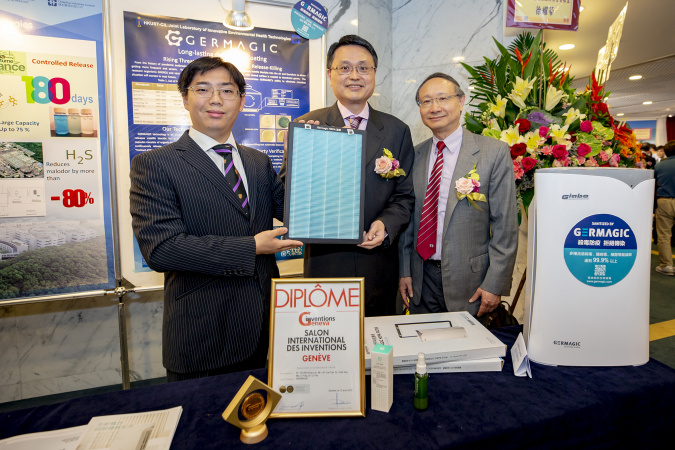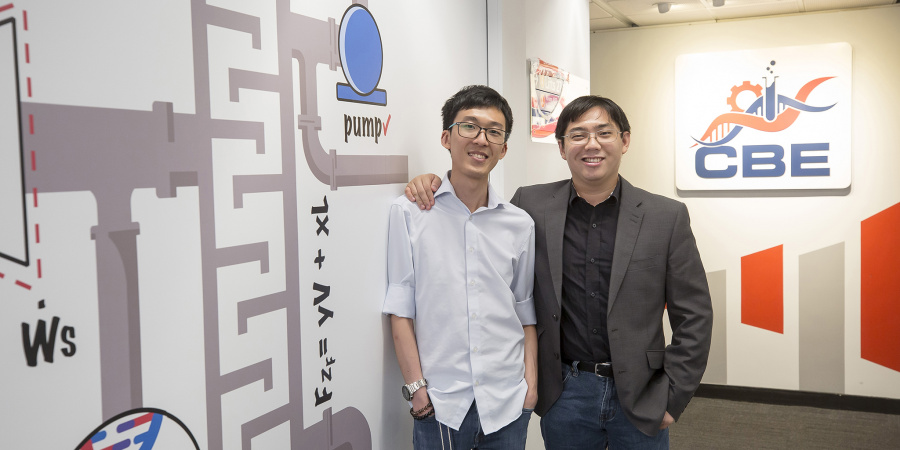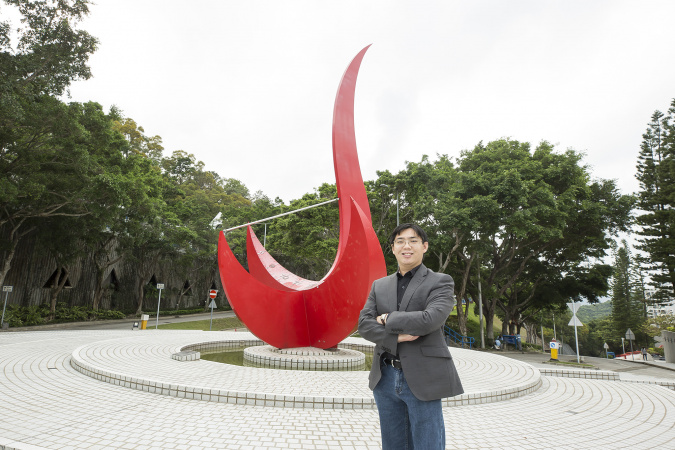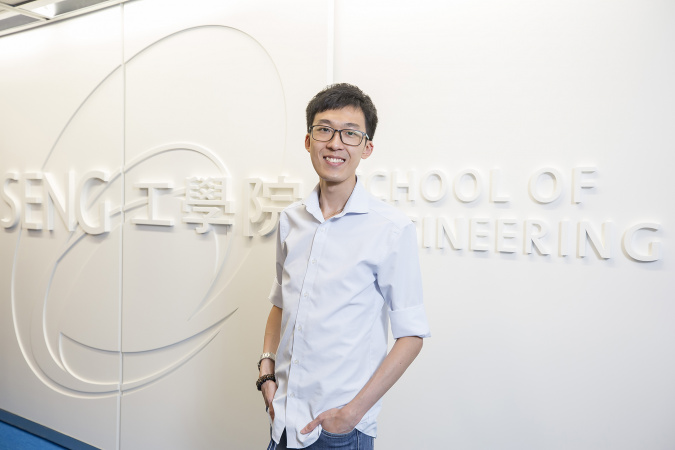HKUST Alumni Join Fight Against COVID-19 with Antimicrobial Technology
As the COVID-19 pandemic swept the globe, much attention was focused on healthcare systems. A quieter front in the fight against the disease was the prevention of its spread through disinfection. Two alumni joined the battle against the unseen enemy, using a long-lasting antibacterial and antiviral spray with a new smart Multilevel Antimicrobial Polymers (MAP-1) coating developed by HKUST.
After completing the Master of Philosophy (MPhil) program at HKUST, alumni Donald LAI Yue-Tak and Winsor LEE Jong-Hong joined Chiaphua Industries Limited (CIL), which owns Germagic, an antimicrobial technology that has proved highly effective in the fight against COVID-19.
The technology was developed by a research team led by Donald and Winsor’s MPhil supervisor, Professor YEUNG King-Lun of the Department of Chemical and Biological Engineering and the Division of Environment and Sustainability. Prof. Yeung is also the director of the HKUST-CIL Joint Laboratory of Environmental Health Technologies (Joint Lab), which was established by HKUST and its industrial partner CIL in 2018.
CIL’s latest product Germagic Thyme contains polyethylenimine and thyme essential oil, which form a coating on objects that inactivates viruses and bacteria. Effective for up to 90 days, the coating can kill 99.9% of viruses, such as measles, German measles, mumps and FCV, a virus found in cats which is considered an important indicator of a product’s efficacy in eliminating the COVID-19 coronavirus.
Sponsored by local charities, disinfection service was arranged for more than 1,000 homes of people from grassroot communities, including those living in cage dwellings and subdivided flats. Germagic coating has now been widely used in public utilities and more than 70 daycare centers, elderly homes, kindergartens and schools, shopping malls, school buses, churches and sports training facilities since the outbreak.
Rising to the challenge
With demand for Germagic escalating rapidly during the COVID-19 outbreak, Donald and Winsor have been working around the clock. “My key duties now range from explaining the technical principles and functionality of the products to both internal team members and external clients to purchasing raw materials and supervising mass production. There are various problems to be solved at every stage,” says Donald, who works as a project engineer at CIL.
He and Winsor also need to get the products tested to ensure they comply with the industry regulations in various countries. For example, Donald says, even if a product has undergone comprehensive testing in Hong Kong, the United States Environmental Protection Agency requires the tests to be repeated there. This prolongs the process of launching even mature technology in the market.
Because the Germagic technology is relatively new, clients have more questions or ask for additional testing based on their needs. “For example, a client might ask if the results of a test done on keyboards at HKUST could be replicated on tablecloths and countertops in their own office,” says Winsor, who is an assistant project engineer at CIL.
They do field tests, collecting samples from different locations and then test them at the HKUST-CIL Joint Lab. Winsor often ends up spending a great deal of time in the laboratory at his alma mater.
Foresight opens up opportunities
CIL offers clients a one-stop service, including a professional team that conducts spraying to ensure that it is properly done. The company has recently launched a retail version of Germagic after tackling some hurdles in packaging.
Their preparation for the new product launch, originally planned for the end of the year, allowed them to act quickly when the COVID-19 crisis broke. “As researchers, we sensed that there might be an epidemic at the end of last year when the first cases appeared. With my boss’s support, we lined up the required raw materials and resources early on and so avoided being affected by the recent breakdown in the supply chain of raw materials,” says Donald.
He also pays tribute to Prof. Yeung’s vision. “He saw the need for epidemic prevention research after the SARS outbreak in 2003. As time passed, even though public interest in this area waned, we insisted on pursuing it. Therefore, when faced with an unfortunate event, we were well prepared and knew how to deal with it.”
Friendship and partnership
Donald and Winsor first met each other in Prof. Yeung’s research lab in 2016. At the time, Donald was finishing up his MPhil. They worked together on a project for a month, before Donald joined CIL.
“As a student, I had worked closely with CIL on projects related to disinfection so it felt quite natural to join the company when I graduated,” says Donald. He recalls he had been interested in research since his secondary school days and that HKUST had been in his sights early on. After completing his undergraduate studies, he realized he was best suited to research and so decided on an MPhil.
Winsor, who is from Malaysia, says he chose a chemistry-oriented major because he loved doing experiments as a boy. The desire to learn how to transform research into marketable products motivated him to join HKUST’s Department of Chemical and Biological Engineering. Although some family members had reservations about him living alone in Hong Kong, he is more than happy with his decision.
Both cite Prof. Yeung as the mentor who has influenced them the most. “He always shows us the way, step by step,” says Donald, with a smile.
Donald was happy that Winsor also decided to join CIL after he graduated. “Prof. Yeung’s inventions are proliferating as are their applications. There were too many for me to handle myself, so I was thrilled to have Winsor on board.”
Donald and Winsor have forged a close and productive partnership. Donald is clearly very fond of Winsor: “He is diligent and willing to share ideas frankly. He doesn’t hesitate to remind me if tasks need my attention and, at the same time, is willing to accept feedback.” Meanwhile, Winsor says: “My relationship with Donald is multi-faceted - he’s like an elder brother, but also a trusted colleague and good friend.”
Training bears fruit
Looking back, the two alumni say their research training at HKUST taught them life lessons that have held them in good stead during their careers. “Research may not always be successful and it may be several years before you see a breakthrough. When problems arise, you must find a solution,” Winsor says.
Donald says meeting the skyrocketing demand for Germagic from countries around the world is also challenging. “There has been an influx of enquiries and a lot of coordination work which really tests my patience.”
However, there is great satisfaction once these obstacles are overcome. “If you’ve been working hard on a project and it eventually receives recognition and helps the community as a whole, it’s incredibly fulfilling,” Donald says. He is particularly proud of their research team winning a gold medal for the antimicrobial technology at the 2018 Geneva International Exhibition of Inventions.
The coronavirus pandemic has once again raised interest in technology, with news coverage of scientific research rising, so both Donald and Winsor see bright prospects for the future.
Over the years, Donald has tried to live up to his motto, “Never give up, follow your beliefs”. “For example, I encountered many obstacles when making product registrations, which stressed me out. There have been times I wanted to give up and doubted whether I was on the right path. Had I not persevered, I wouldn’t be here today.”
Winsor follows an even more straightforward credo: “Try to live happily, don’t regret your choices."
Both these HKUST alumni can be proud that, through their optimism and can-do spirit, they have played a part in serving the world at a critical time.




